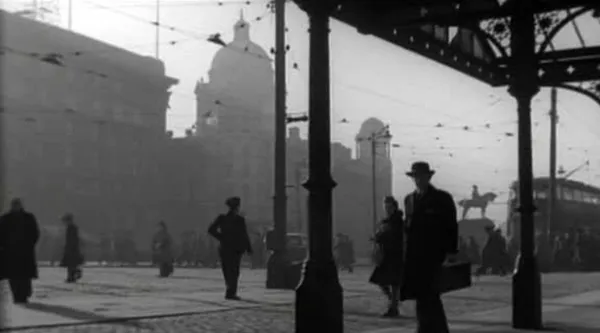Eye For Film >> Movies >> Of Time And The City (2008) Film Review
Of Time And The City
Reviewed by: Val Kermode

First, a confession. I nearly didn’t review this film because I feel so guilty about not liking it. This is a beautifully made film. Terence Davies is probably a genius. I am a great admirer of his previous work. But I just didn’t like this. Maybe it’s a clash of personalities. Davies is a self-confessed pessimist, and I’m not. But here goes…
From the director of Distant Voices, Still Lives, The Long Day Closes and The House Of Mirth comes this first film in almost a decade, an intensely personal view of Liverpool.

Already hailed by some as a masterpiece, this is a visual poem which combines archive footage with a rich selection of music, voices, radio clips and the director’s own voice, mixing personal reminiscence with literary quotation to create a film not just about the city but, as the title suggests, about ageing and mortality.
Opening the film by showing faded cinema curtains, which open to reveal yet another cinema screen, has the effect of drawing us in, while at the same time reminding us that we are looking at a world we can never actually go to. The city of Davies’ youth seems a very distant place, the place of his oppressive Catholic upbringing, of his struggle as a gay adolescent at a time when homosexuality was still illegal, while on the wider stage there is the Royal Wedding of 1947, the Korean War and the advent of rock and roll. All brought to us with the bitter voice of Davies himself.
And therein lies the problem. This is a film about loss, and there was a great deal to lose: the Georgian and Victorian buildings, the close-knit urban communities, the British Empire. But where is the joy? Not for Davies in the new popular music. Classical music drowns out the sounds of the Cavern. Not the children he shows, better fed and clothed, not the greater sexual freedom, not even finding himself to be “a born-again atheist”.
He tells us of “Betty and Phil and a thousand flunkies”. His mother, backing a horse in the Grand National, “I really fancy Quare Times”, unaware of the double meaning. The crowds on the beach at New Brighton, now shown in vivid colour. When Davies says “The world was young and, oh, how we laughed,” he sounds like Death waiting to take them away.
Now in contemporary Liverpool, the “anus mundi”, diners eat out in restaurants housed in deconsecrated churches, or, as Davies tells us: “cocktails are consumed in Babylon.” There is no escape from the sour, the cynical, the sneering. It is as if he himself has come to identify with “Satan smirking behind corners” saying “I’ll get you in the end”.
Eighty percent of the visuals are archive material, most of it drawn together by archive producer Jim Anderson. I found myself marvelling at much of this footage and feeling immensely grateful to those individuals who, long ago, could see the beauty in the pattern of a sequence of doorsteps in sunlight and had the vision and patience to capture this on film.
Davies worked closely with his editor, Liza Ryan-Carter, in what she describes as “an organic process”, not working to a set script but responding to the ideas that came in. An eclectic choice of music provides the counterpoint to many scenes, most memorably the use of Peggy Lee’s song The Folks Who Live On The Hill as the camera pans down an anonymous concrete building looking out onto a derelict urban wasteland. It’s not surprising to learn that this song and the accompanying image were a starting point for Davies in the making of the film.
The planners certainly failed Liverpool, and it seems the city failed Davies. For me, the most powerful scenes are those where music and images combine or, in some cases, the camera just pans in silence, without the waspish tones of Davies telling us what to think. There’s no denying, this is a haunting film, but it leaves a sour taste.
Reviewed on: 19 Oct 2008


















